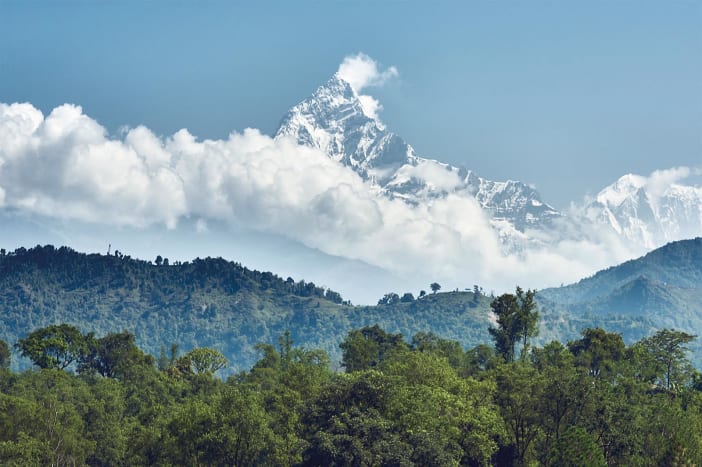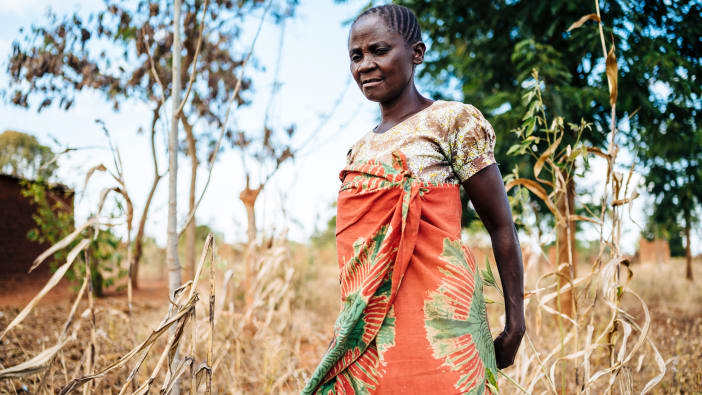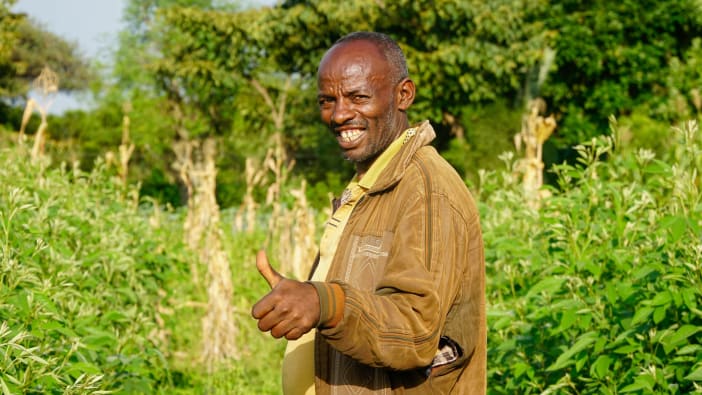In the context of climate change, environmental degradation and loss of biodiversity, farmers have a difficult job. Their farms must provide food for a growing global population, while at the same time protecting and restoring the environment. These seem like big challenges, but fortunately there are effective strategies that farmers can use to overcome them.
Articles
The future of farming
Farming in a sustainable way for a productive future
Written by Neil Rowe-Miller 2020 Available in English, French, Portuguese and Spanish

Learning tree regeneration techniques in East Timor. Photo: World Vision Australia

From: Farming for the future – Footsteps 110
Strategies farmers can use to maintain healthy ecosystems and productive farms
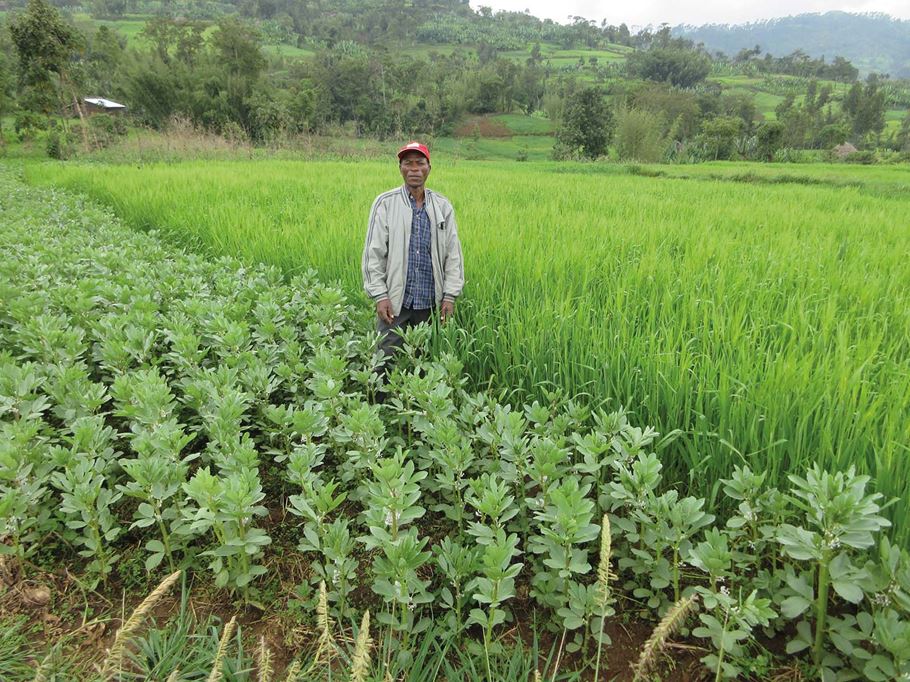
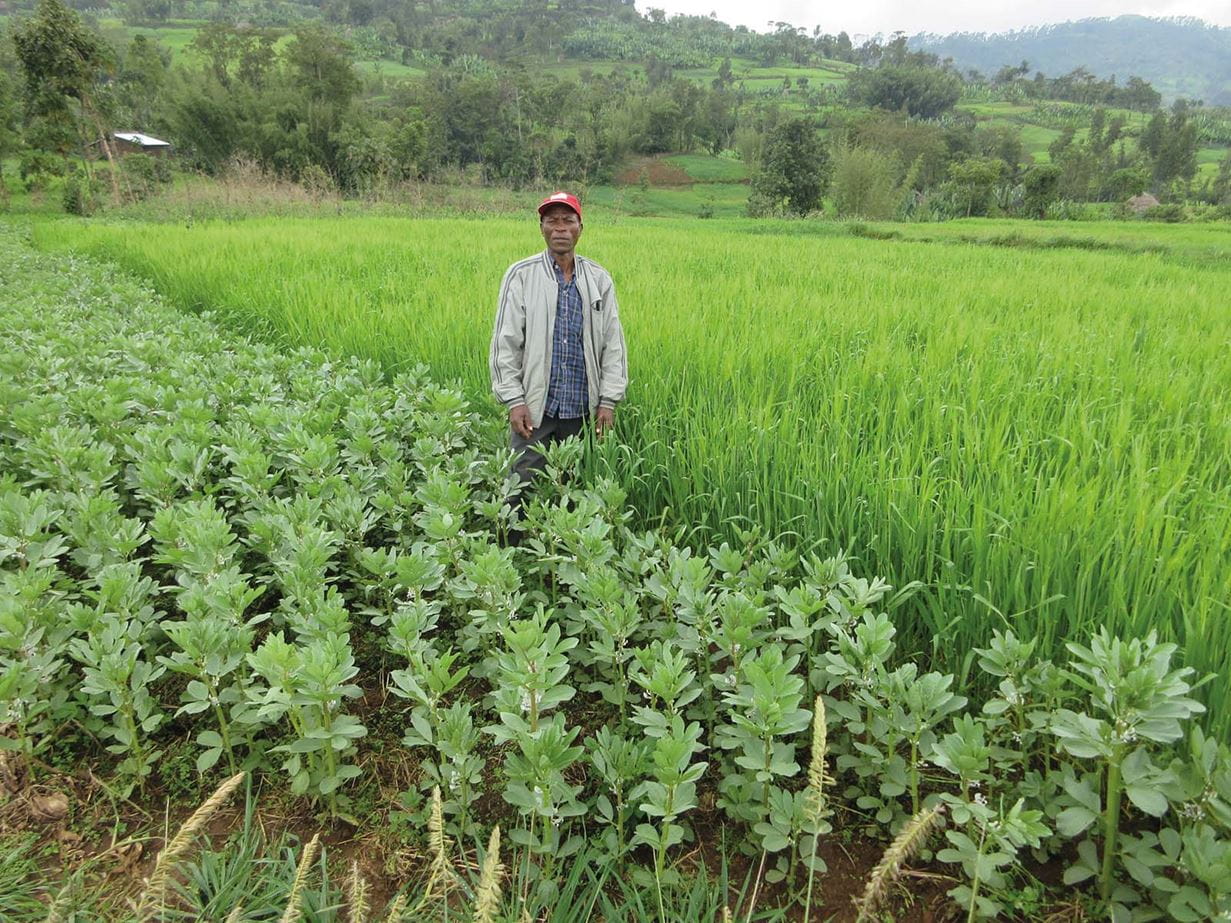
Kibe Kifle in Ethiopia shows his faba bean and barley crops grown using conservation agriculture techniques. Photo: Neil Rowe-Miller
We are already beginning to see the impact of climate change in the form of rising sea levels and more unpredictable weather. In some parts of the world, storms, floods and periods of drought are affecting the health of livestock and disrupting seasonal cropping patterns.
Some farmers are able to irrigate their fields during dry periods, but most small-scale farmers rely on rainfall for crop production and need to find other solutions.
Conservation agriculture is one such solution. It has three basic principles: minimal soil disturbance; permanent soil cover; and the use of more than one crop species, together or in rotation. These strategies help to keep the soil moist, fertile and full of air. Growing more than one type of crop reduces the risk of crop failure and limits any damage caused by pests and diseases. Overall, the result is healthier and more productive crops.
As well as helping farmers cope with changes in the climate, conservation agriculture releases fewer damaging greenhouse gases into the atmosphere than many other cropping systems. This is because undisturbed soil and healthy plants store carbon, and there is less use of nitrogen fertilisers and agricultural machinery.
Sustainable intensification
The world’s population has grown from 3.7 billion to 7.7 billion over the past 50 years, while arable farmland has increased by less than 20 per cent. Since this trend is likely to continue, sustainable intensification of production must be part of the future of farming. This means raising yields and incomes while maintaining healthy ecosystems on and around the farm.
One strategy, known as agroecology, attempts to copy the diversity of natural systems. This often results in increased productivity and means the farming system is better able to cope with environmental challenges such as periods of drought or flooding.
Usually a mix of crops, trees and animals are supported together, making the most of available resources including soil, water and light. The recycling of nutrients also plays an important role: for example, animals eat plants and then their manure is added to the soil to help other plants grow.
Agroecology reduces the need for chemical pest control by including techniques that naturally manage insect populations. This may include planting trees to provide a home for insects that feed on pests, and growing plants that attract pests away from the main crop.
The importance of trees
For generations, tree planting has been promoted as important for livelihoods and environmental improvement.
- Trees release oxygen into the atmosphere and absorb the greenhouse gas carbon dioxide.
- They reduce erosion by holding soil in place and protecting it from the sun, rain and wind.
- Trees catch rainwater and encourage it to soak into the ground.
- They provide shade which protects crops, animals and people from the sun.
- Trees are a source of food, medicines, firewood, fodder for livestock and timber for construction.
- They provide a home for many types of birds, animals and insects, some of which are important for pollination and pest control.
Over the past 30–40 years, a new approach to reforestation has emerged in the form of farmer-managed natural regeneration. This strategy promotes the effective management of naturally occurring trees and shrubs. It is now used in many countries to restore unproductive land and improve agricultural livelihoods.
The role of women
Women play a key role in agriculture and are often among the first to adopt new techniques. However, they are frequently ignored when decisions are being made and may have little power in the communities where they live.
It is crucial that women are fully involved in any farming initiatives, and governments and NGOs should be challenged to include women in positions of leadership. The voices of both women and men must be heard and respected if communities are to make wise decisions for the future.
Time to act
It is important that we act now to restore damaged land, enhance biodiversity and help reduce the impact of climate change. This needs farmers, development agencies, governments and researchers to work together and learn from each other. Sustainable farming practices that have already been widely adopted, such as the ones mentioned above, have all involved mutual learning of this kind.
Some definitions
Climate change
Changes to normal weather patterns caused by human activities.
In the mid-1800s humans began to burn fossil fuels such as coal, oil and gas. Burning fossil fuels produces energy, but it also releases ‘greenhouse gases’ such as carbon dioxide, methane and nitrous monoxide into the air.
Naturally occurring greenhouse gases form a layer around the earth that traps heat and keeps the planet warm. However, human activities mean that there are now more of these gases in the atmosphere than there should be, and too much heat is being trapped. This is causing the planet to heat up, resulting in environmental damage and more unpredictable weather.
Ecosystem (ecological system)
A community of living things that interact with each other and with the non-living things in their environment (eg earth, water, air). If something is added to or taken away from an ecosystem – eg a species change or a rise in temperature – it can affect the natural balance of the interactions and harm or destroy the ecosystem.
Biodiversity (biological diversity)
The variety of living things in a given place. If an ecosystem is biodiverse, small changes will have less of an impact on its stability.
Healthy soils are very biodiverse. They contain billions of organisms that break down organic material, releasing nutrients that are essential for all plants and animals.
Further reading
Conservation agriculture newsletter
Canadian Foodgrains Bank publishes four excellent newsletters on conservation agriculture each year. They are available in English, French, Kiswahili and Portuguese. Download free of charge from www.foodgrainsbank.ca, email [email protected] or write to Canadian Foodgrains Bank, PO Box 767, Winnipeg, MB, R3C 2L4, Canada.
View or download this resource
Get this resource
Get this resource
Written by

Written by Neil Rowe-Miller
Neil Rowe-Miller is Agriculture and Livelihoods Technical Adviser (East Africa) for Tearfund and Canadian Foodgrains Bank. Email: [email protected]
Similarly Tagged Content
Share this resource
If you found this resource useful, please share it with others so they can benefit too.

Subscribe to Footsteps magazine
A free digital and print magazine for community development workers. Covering a diverse range of topics, it is published three times a year.
Sign up now - Subscribe to Footsteps magazine

